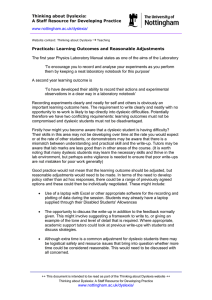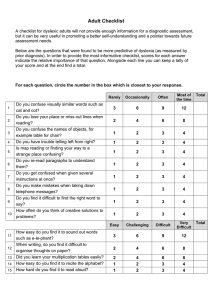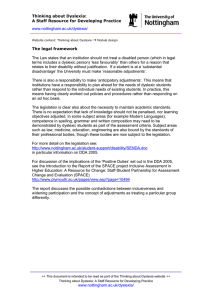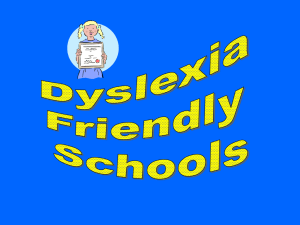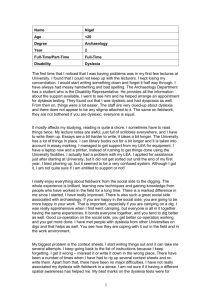Dyslexia Information sheet
advertisement
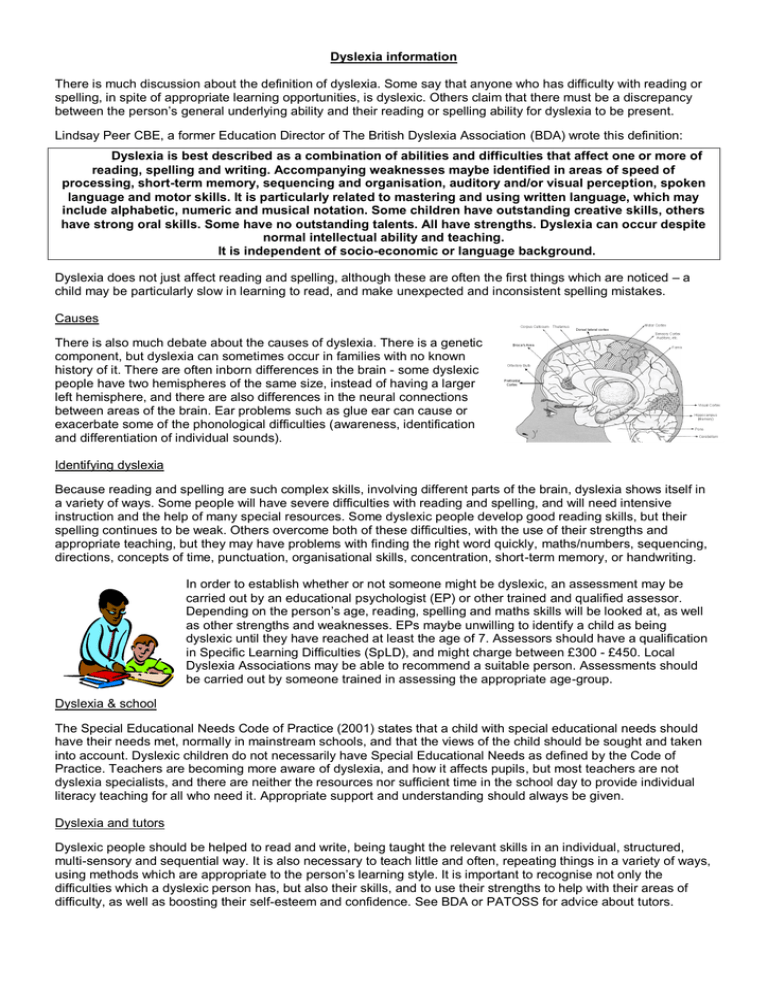
Dyslexia information There is much discussion about the definition of dyslexia. Some say that anyone who has difficulty with reading or spelling, in spite of appropriate learning opportunities, is dyslexic. Others claim that there must be a discrepancy between the person‟s general underlying ability and their reading or spelling ability for dyslexia to be present. Lindsay Peer CBE, a former Education Director of The British Dyslexia Association (BDA) wrote this definition: Dyslexia is best described as a combination of abilities and difficulties that affect one or more of reading, spelling and writing. Accompanying weaknesses maybe identified in areas of speed of processing, short-term memory, sequencing and organisation, auditory and/or visual perception, spoken language and motor skills. It is particularly related to mastering and using written language, which may include alphabetic, numeric and musical notation. Some children have outstanding creative skills, others have strong oral skills. Some have no outstanding talents. All have strengths. Dyslexia can occur despite normal intellectual ability and teaching. It is independent of socio-economic or language background. Dyslexia does not just affect reading and spelling, although these are often the first things which are noticed – a child may be particularly slow in learning to read, and make unexpected and inconsistent spelling mistakes. Causes There is also much debate about the causes of dyslexia. There is a genetic component, but dyslexia can sometimes occur in families with no known history of it. There are often inborn differences in the brain - some dyslexic people have two hemispheres of the same size, instead of having a larger left hemisphere, and there are also differences in the neural connections between areas of the brain. Ear problems such as glue ear can cause or exacerbate some of the phonological difficulties (awareness, identification and differentiation of individual sounds). Identifying dyslexia Because reading and spelling are such complex skills, involving different parts of the brain, dyslexia shows itself in a variety of ways. Some people will have severe difficulties with reading and spelling, and will need intensive instruction and the help of many special resources. Some dyslexic people develop good reading skills, but their spelling continues to be weak. Others overcome both of these difficulties, with the use of their strengths and appropriate teaching, but they may have problems with finding the right word quickly, maths/numbers, sequencing, directions, concepts of time, punctuation, organisational skills, concentration, short-term memory, or handwriting. In order to establish whether or not someone might be dyslexic, an assessment may be carried out by an educational psychologist (EP) or other trained and qualified assessor. Depending on the person‟s age, reading, spelling and maths skills will be looked at, as well as other strengths and weaknesses. EPs maybe unwilling to identify a child as being dyslexic until they have reached at least the age of 7. Assessors should have a qualification in Specific Learning Difficulties (SpLD), and might charge between £300 - £450. Local Dyslexia Associations may be able to recommend a suitable person. Assessments should be carried out by someone trained in assessing the appropriate age-group. Dyslexia & school The Special Educational Needs Code of Practice (2001) states that a child with special educational needs should have their needs met, normally in mainstream schools, and that the views of the child should be sought and taken into account. Dyslexic children do not necessarily have Special Educational Needs as defined by the Code of Practice. Teachers are becoming more aware of dyslexia, and how it affects pupils, but most teachers are not dyslexia specialists, and there are neither the resources nor sufficient time in the school day to provide individual literacy teaching for all who need it. Appropriate support and understanding should always be given. Dyslexia and tutors Dyslexic people should be helped to read and write, being taught the relevant skills in an individual, structured, multi-sensory and sequential way. It is also necessary to teach little and often, repeating things in a variety of ways, using methods which are appropriate to the person‟s learning style. It is important to recognise not only the difficulties which a dyslexic person has, but also their skills, and to use their strengths to help with their areas of difficulty, as well as boosting their self-esteem and confidence. See BDA or PATOSS for advice about tutors. Learning styles There are a variety of ways in which people learn and remember information most easily – some like to see things written down, and will learn well from reading. Other visual learners will prefer to use diagrams or pictures rather than words. Some people are auditory learners, and need to hear words spoken aloud in order to remember them well, or may recall things if they have rhythm or are set to music. Yet others (kinaesthetic learners) need to be physically involved, by movement or touch, before they are able to take in new ideas, and will benefit from practical experimentation and the use of objects to touch and handle. Other differences in learning style are between those who learn step-by-step (sequential learners), and those who like to see the whole picture first and then fill in the details (gestalt or global learners). It is important to recognise the differences in these learning styles, although many people have a combination of various styles. This is where multi-sensory teaching is especially important for dyslexic people: there is more chance of learning being retained if as many senses as possible are used. Teaching reading and spelling The recognition of symbols comes during the first few years, when a child will recognise the signs seen in daily life, such as Co-op, Tesco, Sainsbury’s, Boots, McDonald’s etc. These logos often incorporate colour and a specific style which is recognised, without the words being read. Children will be taught to write their name and other common words, and will remember the letters by shape, form and sequence, not by the sounds each letter makes. Often children will make mistakes with their name at this early stage, but if errors persist, it may be an indicator of an underlying problem. The next stage is to match letters with their individual sounds, and then pairs (sh, ch, th, qu, ng, nk, ai, oi, ie, etc.) or groups of letters (igh, tion, etc.) with a particular sound. Non-dyslexic people often „pick up‟ these conventions quite quickly and easily, but dyslexic people need to be taught the letter/sound relationships quite specifically. This is where structured and sequential teaching is important, so that the learner is taken through the various steps in order, starting with the simplest and gradually building to the more complex. Most structured programmes follow a similar path. Short-term memory and sequencing difficulties mean that dyslexic people need lots of opportunity to practise and refine their skills, and need to be taught the same thing in a variety of ways (over-learning). Older children and adults may benefit from using a word processor, making their work easier to alter, and helping with good presentation. If their handwriting is not very legible, either due to motor difficulties or spelling errors, it will be helpful to learn to touch type. The „muscle memory‟ may help with spelling, as the fingers 'remember' the keys. Reading and spelling are very different skills, using different pathways of the brain, and should both be taught specifically. All attempts should be praised, and the learner should be taught a skill and allowed to practise and gain confidence before moving on to the next stage. Reading to a child will encourage enjoyment of stories and books, and will motivate them to want to read for themselves. Learners should not be criticised for their errors – nobody makes mistakes on purpose – but they should be praised and encouraged for any efforts made. Maths Dyslexia may affect maths ability too. Sometimes it is because of the difficulties with sequences, short-term or working memory, direction, and orientation of symbols: numbers may be reversed, or signs mis-read. It may also be due to a basic difficulty with grasping the concepts of number, causing more severe problems (dyscalculia). However, some dyslexic people excel at maths. Study skills There are many aspects of study skills: reading accurately, comprehension, memorising facts, identifying relevant information, making notes, condensing information which has been read or heard, having creative ideas, producing in written (or other) form a structured and understandable piece of work which will communicate with someone else… and so on! Dyslexic people often find these skills difficult, and so need to be taught them, and given opportunity to practise, using their preferred learning style and strengths. 2 Some people find that a good way to revise, as well as to plan for extended writing, is to use „learning maps‟. These are a visual form of writing and linking information, such as the Mind-Maps http://www.mindmapping.co.uk/make-mind-map.htm created by Tony Buzan. The main subject, title or idea is written (or drawn) in the centre of a blank page (landscape view, not portrait). It is then circled, and lines drawn from it in different directions, with the next big ideas written (or drawn) at the end of the lines. These ideas are then circled, and more and more detail added. Colour and images can also be used. The ideas are then ordered and numbered, before being written out in linear form. People with a kinaesthetic learning style may like to trace along the lines with their fingers, reading aloud as they do so. Auditory learners may prefer to record the information onto cassette (or other media) so that they can play it back repeatedly, or to record questions to be answered orally. Special examination arrangements For those sitting GCSE and other examinations, the exam centre (school or college) may be able to make special arrangements such as up to 25% extra time, a reader, a scribe or the use of a word processor. The guidelines for these arrangements are produced by the Joint Council for Qualifications and are up-dated each year www.jcq.org.uk . The centre should apply for special arrangements at the start of a course of study, and a suitably qualified specialist will need to make the application. Strategies to help with other difficulties Time: Use whichever type of watch is easiest – analogue or digital. Help with organising time by using diaries, calendars, notes, alarms or reminders. Use the language of time when talking e.g. “It‟s half an hour until…” Organisation: If you plan a trip out, write it on the calendar and talk about what you will need to take. Use checklists when you pack for a holiday, and let our child can see you planning and checking. Let them help write the weekly shopping list – good for „real‟ writing as well as organisation. If short-term memory is a problem, encourage use of a Dictaphone or written notes. Label things, and buy lots of cheaper stationery items, so you don‟t worry if they get lost. Use coloured folders/wallets to organise written work. Handwriting: Use whatever pen or pencil aids neat writing. Younger children might like to use a rubber triangular grip to help adopt a good pen hold. Cursive (joined-up) handwriting can help good flow, as well as neatness, and can aid spelling by using the muscle memory. It is best taught when young, and with a style which joins each letter to the next. Concentration: Fish oil supplements (omega-3 essential fatty acids, but need to be in proportion to omega-6) may help. Other things may increase concentration: drink a glass of water before studying; use active reading techniques (ask yourself questions as you read, make notes, jot down key words etc.); read out loud; walk around as you study; have plenty of fresh air; have a break when necessary; do physical exercise in between study times. Some positive attributes of dyslexia Some dyslexic people have strengths in certain areas such as mathematics, art, mechanical ability, dance or sport, intuition, creative and imaginative thinking, 3D visual-spatial skills. Many become very strong and determined as a result of fighting to overcome their difficulties, and often find inventive ways to solve problems. Famous dyslexic people There are many famous and successful people who are dyslexic, such as Richard Branson (businessman), Tommy Hilfiger (clothes designer), Robbie Williams (singer), Jamie Oliver (chef), Cher (singer/actress), Whoopi Goldberg (actress), Princess Beatrice (granddaughter of Queen Elizabeth II), A A Gill (writer), Kara Tointon (actress), David Bailey (photographer), Steve Redgrave (Olympic gold medal rower), Lord Richard Rogers (architect), Michael Heseltine (retired politician) and many more! Some web sites have lists of dyslexic people, but be aware that not everything on the web is accurate, and some lists are misleading or contain errors due to poor research. 3 Various other means of helping Due to the different factors which affect dyslexia, there are a variety of methods to help overcome it. Some of the theories are not backed up with adequate research, but may be worth looking into, to see if they help. Coloured overlays/glasses www.dyslexic.org.uk Some people are more sensitive to light intensity than others, and the contrast between black and white in a page of text may cause visual symptoms such as blurring of the words, apparent movement or swirling of the text, etc. This may be reduced by placing coloured filters over the page, by wearing glasses with coloured lenses, or by using pastel coloured paper instead of white. Coloured filters do not have to be very sophisticated – you can experiment with various colours of polythene pockets used in a single layer over a page of writing. Visual disturbance may also occur when using computers screens, so adjusting the background colour may help. The Davis Method www.davistraining.co.uk Ron Davis, an American dyslexic dyslexia practitioner, writes in his book „The Gift of Dyslexia‟ that it is the disorientation which dyslexic people suffer which affects their ability to read or spell. Because some dyslexic people have an ability to use their 'mind's eye' in many spatial dimensions, they become disorientated when looking a letters or words, which must be viewed in only one way to make sense. He also says that some words have strong associations with a definite object (such as horse, fence, bucket) and so links with the meaning and imagination can be made, whereas other words do not have associations with objects (such as from, a, the, away etc.) and so these words are hard to imagine and comprehend. When reading, it can often be these smaller words which cause difficulty for dyslexic people. Part of the Davis training is to form physical associations for these difficult words (for example, by making clay models), until they are mastered, and also to teach people how to control the 'mind's eye' and perceive things in only one dimension when necessary. Omega 3 and Omega 6 www.dyslexic.org.uk An area of current research is how diet affects learning difficulties, and particularly how the polyunsaturated fatty acids Omega 3 (found in some fish oils) & Omega 6 affect dyslexic people. It is thought that a deficiency in these essential fatty acids can contribute to a lack of proper brain function and concentration, which in turn affects learning. Many people's diets are lacking in these essential fatty acids, and so supplements can help. Brain Gym® www.braingym.org.uk Brain Gym is an educational, movement-based programme which uses simple exercises to integrate the brain, senses and body, preparing the person with the physical skills they need to learn effectively (also called Educational Kinesiology). Touch-type, Read and Spell www.ttrs.co.uk This is a course of touch-typing which incorporates a structured spelling programme, based on the Alpha to Omega book. It can be bought privately, or accessed at local centres. Useful websites or books www.amazon.co.uk Dyslexia Pocketbook Julie Bennett Teachers‟ Pocketbooks ISBN 978-1-903776-28-1 www.bdadyslexia.org.uk British Dyslexia Association www.patoss-dyslexia.org Professional Association of Teachers of Students with Specific learning difficulties PATOSS – for private tutors Dyslexia How to survive and succeed at work Sylvia Moody Vermillion, London www.dystalk.com Very useful video talks about many aspects of specific learning difficulties Maths for the Dyslexic Anne Henderson David Fulton Publishers www.dys-add.com Bright Solutions for dyslexia: Some useful general information about dyslexia (an American site). Teaching Reading & Spelling to Dyslexic Children Margaret Walton David Fulton Publishers ©Margaret Stranks (February 2011) Alpha to Omega Bevē Hornsby, Frula Shear, Julie Pool Heinemann ISBN: 0435104233 Headington Dyslexia Support Margaret.stranks@gmail.com The Study Skills Handbook Stella Cotrell Palgrave Macmillan ISBN 01865 454353 or 07729 129578 4
